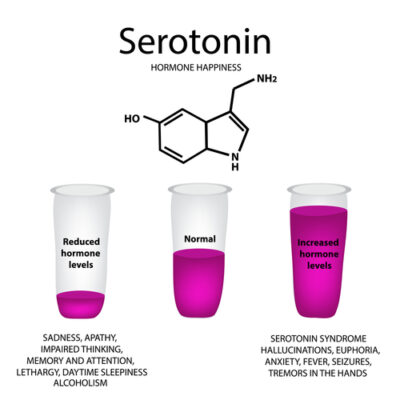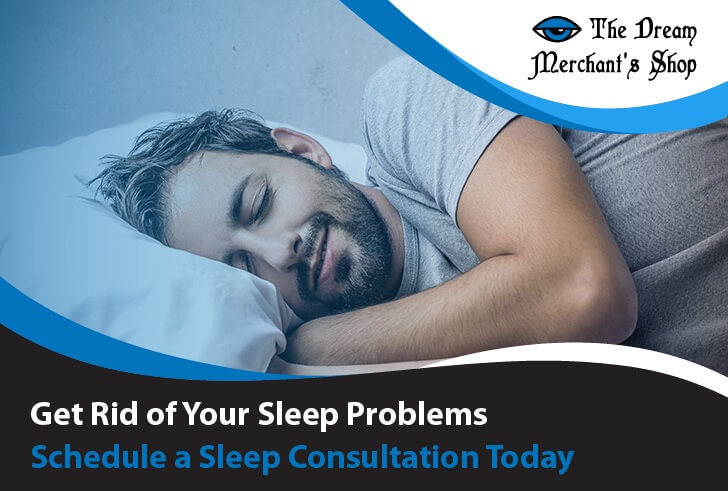A direct precursor of serotonin, 5-HTP (5-hydroxytryptophan) is one of the commonly used lucid dreaming supplements out there.
Given its links to serotonin, 5-HTP is obviously a promoter of deep-sleep stages, and a suppressor of REM.
Since REM is so important for dreaming (and thus for lucid dreams too), why exactly is 5-HTP considered a dream-enhancing supplement? How does it work and when should you take it? Let us take a closer look.

What are 5-HTP’s effects on sleep?
Since 5-HTP is a great solution to introduce surplus serotonin into the system, and since that is what it is used for in regards to dreams, lucid dreaming and astral projection, it makes perfect sense to explore serotonin’s impact on sleep, before we take a closer look at how 5-HTP acts out its role.
Serotonin is a sort of opposite of acetylcholine. While the latter is a well-known promoter of REM sleep, serotonin promotes deep stage (3-4) sleep.
Serotonin’s effects may seemingly work against those of acetylcholine but the two neurotransmitters work together to modulate the sleep cycle.
During the deep sleep cycle (which is absolutely necessary for proper rest and regeneration), acetylcholine levels drop and serotonin levels spike.
Later during the cycle, serotonin levels begin to drop and acetylcholine levels spike, ushering in the REM stage of sleep which – according to current science – is the stage most suited for dreaming.
With that in mind, looking to boost serotonin levels though a supplement like 5-HTP, may seem counterintuitive. Indeed, it would make no sense at all, were it not for an effect known as the REM rebound effect.
What is the REM rebound effect?
Interestingly, serotonin’s acetylcholine-busting effects may actually result in longer periods of REM sleep towards the morning hours, after the effects of the supplements responsible for the serotonin spike earlier on, have mostly worn off.
How does it happen?
The body seems to have a built-in sensor in regards to sleep. It needs proper sleep, and when its regular sleep cycles are disturbed, it will act toward re-establishing its balance.
Serotonin may banish REM sleep while it acts, but as soon as it is out of the system, the body begins to make up for the imbalance, by prolonging the REM stage.
This is why – unlike acetylcholine-boosting supplements – serotonin-aimed supplements should be taken right before going to bed.
The above makes it clear that – unlike the other neurotransmitters of the “Big 4” – serotonin exerts a very complex effect on the body: it can excite but it can also inhibit.
Furthermore, its sleep-related act is just a tiny part of its repertoire. Besides sleep, it also acts upon pain, mood and appetite.
By taking a supplement that boosts your serotonin levels (like 5-HTP) you stand to reap benefits above and beyond the realm of dreams and astral projection.
Elevated serotonin levels have been found to improve mood and the ability to focus, providing better relaxation, more drowsiness, decreased anxiety and depression, as well as decreased sex drive.
On the other hand, low serotonin levels lead to depression/anxiety, bipolar disorder and headaches – among a number of other, similarly uncomfortable conditions. Indeed, as a serotonin precursor, 5-HTP has been used for the treatment of depression and anxiety.
Are 5-HTP supplements safe?
While the serotonin level variations are within reasonable limits, it can indeed be considered safe. When these levels become too high though, a condition called serotonin syndrome is triggered. This condition may even be lethal, so there’s absolutely no room for error when it comes to the proper dosing of your supplements.
Serotonin Syndrome is characterized by shivering, sweating, agitation, confusion, muscle twitching and even coma. The good news in this regard is though that in order to achieve the serotonin levels required for serotonin syndrome, one has to combine several supplements which stack on and amplify each-others’ effects.
By simply taking reasonable doses of 5-HTP for instance, there’s little to no serotonin syndrome danger present.
How much is too much though?
In regards to 5-HTP, doses exceeding 6-10 grams per day are way outside the comfort zone and you should make sure you do not stray into that territory.
People have been known to safely use 400 mg/day of the compound, for periods of up to 1 year.
How does 5-HTP affect sleep?
As said above, it is an important sleep-modulator, the effects of which are manifested in more vivid dreams. This dream effect is due to the longer REM sleep stages, which are in turn due to the above-described REM rebound effect.
To make a long story short: serotonin (boosted by 5-HTP) suppresses REM sleep during the first few sleep cycles of the night.
As you probably know, the body cycles through 5 sleep stages, 5 or 6 times a night. The last stage is always the REM one. During the first 2-3 sleep cycles of the night, this stage is naturally shorter than the other – deep sleep – stages.
Serotonin further boosts deep sleep, and it cuts these already short REM periods even further back.
Towards the morning, during the last couple of sleep-cycles of the night, REM stages become naturally longer. With the boosting effects of 5-HTP out of the system by this point, these sleep stages become even longer and deeper, thanks to the above said REM-rebound effect – hence the more vivid dreams and better dream recall.
What serotonin achieves dreams-wise is in essence an “optimization” of the REM stages.
The shorter ones – which result in shorter and more easy-to-forget dreams – are cut, and they are in essence “piled onto” the later sleep cycles, which are much more productive dreams-wise anyway, producing dreams the dreamer is much more likely to remember too.
On a personal note: I can tell you that serotonin-influenced dreams tend to be generally calmer and more relaxed than their regular peers.
What is 5-HTP?
5-hydroxytryptophan is a metabolite of the amino acid tryptophan. 5-HTP is the best supplement for the boosting of serotonin, for several reasons.
First of all: it is serotonin’s direct precursor, which means that it is directly responsible for the amount of serotonin generated in one’s system.
Secondly, it crosses the blood-brain barrier much more readily than say tryptophan.
The type of 5-HTP that you’ll be able to purchase from your supplement supplier has most likely been extracted from Griffonia simplicifolia leaves.
As far as drug interactions are concerned, 5-HTP is known to compound the effects of certain anti-depressants, which also act on serotonin levels. As pointed out above, very elevated serotonin levels can trigger some serious (even life-threatening) side-effects.
More about 5-HTP Sleep Effects
As said above, 5-HTP balances sleep, optimizing the REM stage and generally improving its quality.
When on 5-HTP, I have longer lasting, more vivid and easier-to-remember dreams than otherwise, and I also wake up feeling replenished and ready to take on the challenges of the day.
This is extremely important for a high-volume lucid dreamer such as myself. Without proper deep sleep, the extension of the REM stage is not a sustainable practice.
As I mentioned above, 5-HTP should be taken when going to bed.
Supplements which promote REM sleep through the acetylcholine pathway, have to be taken 4-5 hours later, which usually means a disruption of sleep.
I heard some say that this is a distinct advantage of 5-HTP, since – besides improving deep sleep – it does not disrupt sleep either.
I beg to differ on this account though.
For the best possible effect, 5-HTP should be taken in combination with other supplements, more precisely with acetylcholine-focused supplements that have to be taken after 4-5 hours of sleep.
It makes absolutely no sense to down these supplements together with 5-HTP as they elicit opposing effects, and that may indeed cancel out the whole exercise.
With that in mind, here’s a possible “blueprint” to properly putting to use the supplements I discuss on these pages:
Before you hit the sack, down some 100-150 mg of 5-HTP.
Then, after 4-5 hours of a sleep, just about when the effects of 5-HTP are starting to wear off, add 6-8 mg of galantamine or a corresponding amount of Huperzine A.
To cap it all off, toss some 500 mg of choline into the mix as well.
That’s a sample supplement dosage/usage guide, which can yield decent results, but which I used mainly to illustrate the complex nature of LD and AP-focused supplementation.
The said dosages can be experimented with, within a small range above and below the stated amounts.
The optimum dose is obviously the one that results in the highest number of lucid dreams of the best possible quality.
Melatonin is the compound serotonin is metabolized into, so it too can/should be considered for a supplement combination like the above-described one.
Conclusion: 5-HTP Sleep & Dream Effects
As the most potent serotonin-promoting supplement, 5-HTP does indeed have scores of uses.
While it is generally safe to use in the doses specified above, you need to be aware that there are risks involved with every supplement that actually has an active substance in it.
Be aware of 5-HTP’s interactions with other medications, and do not take it with alcohol (though that should be quite obvious).
As every one of the supplements discussed on these pages, 5-HTP works best when used in combination with other LD-stimulating supplements. It provides some benefits when used on its own too, but the actual LD-wise results it will produce that way, will be unimpressive at best.


